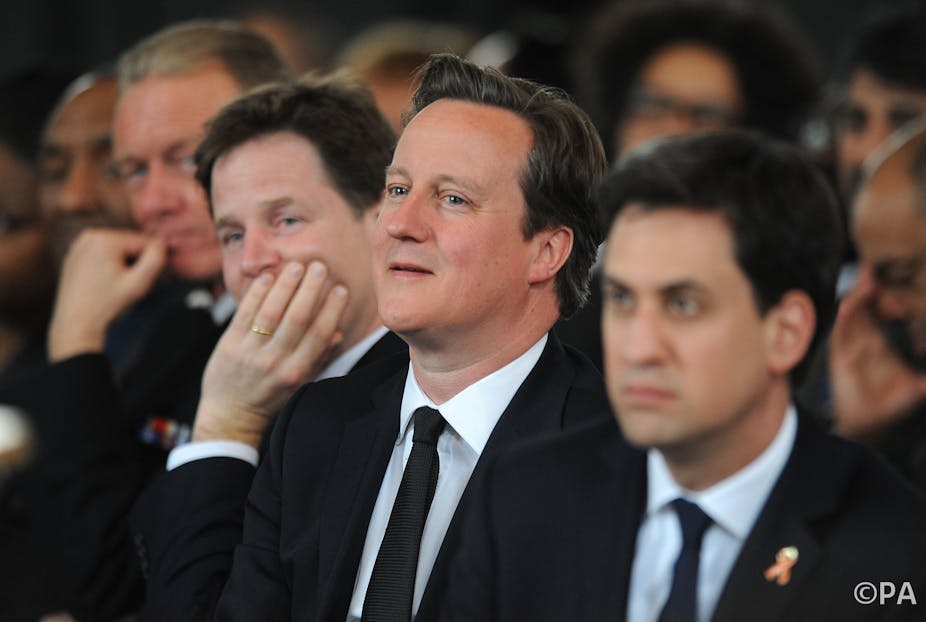The difficult-to-predict nature of what a Yes vote in the Scottish referendum would mean is, in part, what makes the possibility so fascinating, so exciting and so scary. It seems, to a large degree, a leap into the unknown and people’s gut feelings play as much of a role as sober analyses.
But while the vote raises all kinds of questions about the future of Scotland, it also opens up great uncertainty for British political parties more generally. It’s possible, for example, that a Yes vote could push politics in the remainder of the UK to the right.
2015 and beyond
It is often noted that the referendum has the potential to affect future elections in the short term because of the loss of Scottish constituencies after a Yes vote. Labour and the Liberal Democrats would be hit disproportionately hard by this, although the impact of the loss is usually over-exaggerated.
But a less widely discussed result would be the transformation of the 2015 election campaign itself which could swing to the right even before Scottish seats disappear. This is because the contest would no longer boil down to promises about living standards or coalition failures but would also be based on questions about who voters want to negotiate the separation from Scotland.
The parties would then compete over who could be the toughest in squeezing out the best deal for the remaining UK, and England in particular, as independence approaches.
The Conservatives and UKIP may well find it easier to portray Labour and the Liberal Democrats as “soft touches” when it comes to Scotland than to campaign directly on a programme of austerity and cuts. A wellspring of nationalist resentment is already rising among sections of England over the Scotland vote and the right-wing parties seem well positioned to capitalise on feelings of hurt and rejection. A tough line on the financial package offered to Scotland could be sold as part and parcel of continued “fiscal rigour” in what is left of the UK. Even with a No vote, the question of devolving more powers to Scotland could lead to similar arguments.
Who takes the blame?
There is of course speculation that the public could blame the Conservatives for a Yes vote. They do head the coalition government and many argue that defeat on September 18 could spell doom for David Cameron. He already faces opposition from eurosceptic backbenchers who appear to be looking for an excuse to replace him as leader and presiding over the break up of the Union would seem like the perfect excuse. But in fact, a defeat for the No camp could be worse for Labour.
From the very start, the consensus has been that the Conservatives would only have made things worse if they spent more time campaigning in Scotland. That’s why the No campaign has essentially been led by the Labour Party, in the form of Alistair Darling and now Gordon Brown.
A defeat might therefore actually attach itself more steadfastly to Labour than the Conservatives. Gordon Brown will no longer be just the man who broke the economy, according to right-wing rhetoric, but the man who broke the Union too.
Of course, the left could fight back – asserting its strength as negotiator. Aware of the dangers the Scottish referendum brings, Labour figures are already talking about realigning to appeal more directly to “English identity”. A broadly soft-nationalist approach has worked well for Labour in Wales, but whether or not “One Nation” rhetoric can be rearticulated into an English Labour discourse without distressing as many people as it attracts, is far from clear.
For the Liberals, who are already facing single digit support, things simply look bleak.
Admittedly, this is all to portray an extreme scenario. Plenty could happen over the next few days, or after the vote, that could blow such possibilities out of the water. All three main Westminster parties have agreed a preliminary timetable to devolve more powers to Scotland in the chance of a No vote, and they may even enter into independence negotiations as a cross-party group in the event of a Yes. If the major parties somehow agreed to delay the election until independence became a reality, the issue could even be drained of rancour.
But the British have never done well with consensus politics and it’s easy to imagine the arguments of populists of the right trumping idealistic calls to cross-party consensus. People delighted or worried by promises of a post-election referendum on EU membership, may therefore have added reasons to pay attention to the Scottish referendum.

